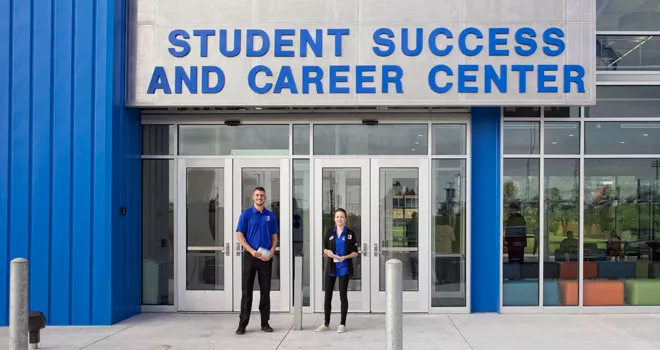Fire & Emergency Medical Services Technology, A.A.S.
Unlock your firefighting future with our Fire & EMS A.A.S. program. Learn, certify, and serve with confidence.
About the Fire & Emergency Medical Services Technology Degree
- This program is recognized by the National Fire Academy for Fire and Emergency Services Higher Education.
- Completing specific FEMS courses will earn you valuable National Fire Academy Certificates.
- You will also obtain the necessary state and national certifications required for employment in various fields:
- Fire departments
- Industrial firms
- Governmental agencies
- Fire protection companies
- Healthcare agencies
- Emergency medical services agencies
- If you're looking to work in fire and emergency medical services, you'll need certifications as a Firefighter/Emergency Medical Technician (FF/EMT).
Fire & Emergency Medical Services Technology Degree Details
Discover the path to becoming a certified firefighter/EMT. Gain essential skills for a rewarding career.
You will need to possess certain qualities to succeed as an Emergency Medical Technician. Here are some of those that will help you be successful in the profession:
- Compassion: EMTs and paramedics must provide emotional support to patients in an emergency, especially patients who are in life-threatening situations or in extreme mental distress.
- Interpersonal skills: EMTs almost always work on teams and must be able to coordinate their activities closely with others in stressful situations.
- Listening skills: EMTs need to listen to patients to determine the extent of their injuries or illnesses.
- Physical strength: EMTs need to be physically fit. Their job requires a lot of bending, lifting, and kneeling.
- Problem-solving skills: EMTs need strong problem-solving skills. They must evaluate patients' symptoms and administer the appropriate treatments.
- Communication skills: EMTs need to be able to comfort and explain procedures to the patient, give orders, and relay information to others.
After successfully completing this program, you will have the ability to:
- Communicate within the National Incident Management System.
- Integrate fire service laws, rules, and regulations.
- Sustain professional development with relevant resources.
- Work collaboratively and respectfully within the community.
- Analyze technical information.
- Apply technical information.
View the Degree Requirements to find out which courses and credits you'll need to earn your degree.
Explore the Program Map to see how you can complete your degree.
- Complete all TCC application and entry requirements.
- Students with prior learning through academia or life learning may demonstrate that they have met the requirements of the Certificate through transcript review or Prior Learning Assessment.
- Students must complete a reading and writing placement test to enroll in general education classes.
- Students must make a minimum grade of “C” on all general education requirements for the degree, and all FEMS and EMSP courses.
Program Contact
Program Coordinator
Donnell Campbell
918-595-8408
donnell.campbell@tulsacc.edu
School of Health Sciences
TCC Northeast Campus
3727 East Apache Street
Tulsa, OK 74115
918-595-7002
healthsciences@tulsacc.edu

Careers in Fire & Emergency Medical Services Technology
Don't miss out on the opportunity to connect with our Career Services professionals. Schedule a session now to explore the comprehensive range of complimentary resources available for career planning and job preparation.
